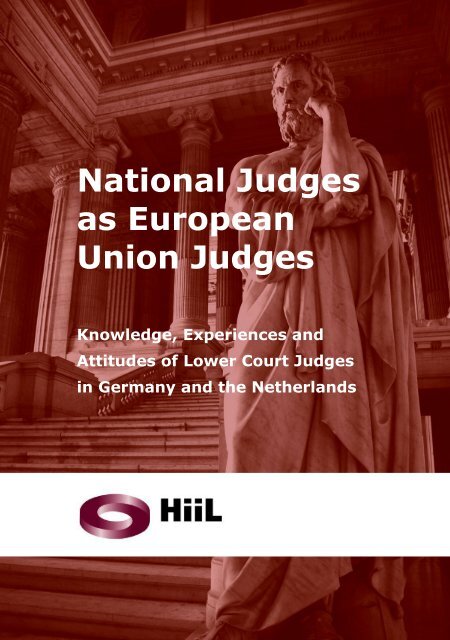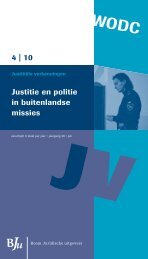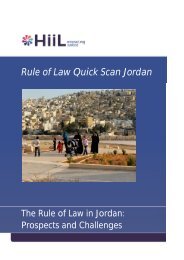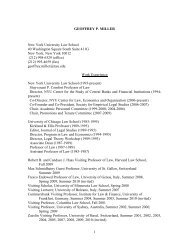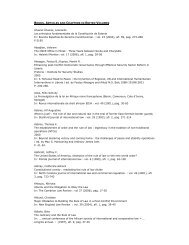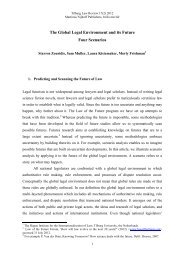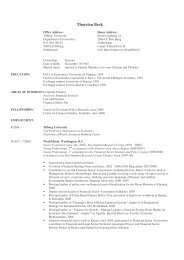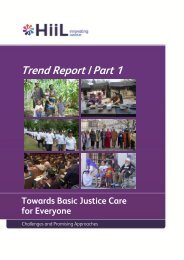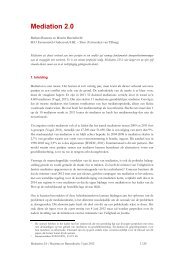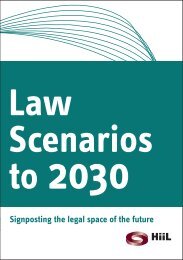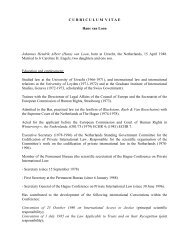National Judges as European Union Judges - HiiL
National Judges as European Union Judges - HiiL
National Judges as European Union Judges - HiiL
Create successful ePaper yourself
Turn your PDF publications into a flip-book with our unique Google optimized e-Paper software.
<strong>National</strong> <strong>Judges</strong><br />
<strong>as</strong> <strong>European</strong><br />
<strong>Union</strong> <strong>Judges</strong><br />
Knowledge, Experiences and<br />
Attitudes of Lower Court <strong>Judges</strong><br />
in Germany and the Netherlands
<strong>HiiL</strong> Focus: Judiciary in the<br />
internationalised world<br />
<strong>National</strong> courts are incre<strong>as</strong>ingly influenced by developments beyond their country’s<br />
borders <strong>as</strong> they seek to uphold the laws of their land. As a result of the incre<strong>as</strong>ing<br />
internationalisation of law, the role of the national judiciary h<strong>as</strong> been evolving to<br />
include these developments. This phenomenon features prominently on the<br />
<strong>European</strong> level where EU law h<strong>as</strong> high expectations of how national judges should<br />
perform their t<strong>as</strong>k <strong>as</strong> ‘decentralised EU judges’.<br />
These issues are at the heart of the <strong>HiiL</strong> research agenda which focuses on the<br />
challenges posed to the maintenance and promotion of rule of law in a world of<br />
intertwined legal systems. In particular, this research fits within the remit of the<br />
<strong>HiiL</strong> Highest Courts research theme <strong>as</strong> it provides highest courts at the <strong>European</strong><br />
and national level with the information on what lower national courts need in order<br />
to function in a multi-level legal order.<br />
<strong>HiiL</strong> Project research team<br />
<br />
<br />
<br />
<br />
Mark Wissink – University of Groningen<br />
Tobi<strong>as</strong> Nowak – University of Groningen<br />
Fabian Amtenbrink – Er<strong>as</strong>mus University Rotterdam<br />
Marc Hertogh – University of Groningen
‘The experiences that Dutch and German civil law judges have with<br />
the application of <strong>European</strong> <strong>Union</strong> law are very similar: for most judges<br />
<strong>European</strong> <strong>Union</strong> law plays only a minor role in their daily work. The<br />
feeling that their knowledge of <strong>European</strong> <strong>Union</strong> law is insufficient is a<br />
consequence of this sporadic application; the sporadic application is not<br />
necessarily a consequence of insufficient knowledge. For most judges<br />
<strong>European</strong> <strong>Union</strong> law is just another set of rules they have to apply.’<br />
Tobi<strong>as</strong> Nowak | University of Groningen<br />
This research project is funded by <strong>HiiL</strong> and conducted by the law faculties of the<br />
University of Groningen and the Er<strong>as</strong>mus University of Rotterdam, with the<br />
cooperation of the Raad voor de Rechtspraak and Ministry of Justice of North<br />
Rhine-Westphalia.
Knowledge, Experiences and Attitudes<br />
The research project reveals the practical problems that national judges<br />
experience when applying <strong>European</strong> <strong>Union</strong> law. It focuses on national judges at<br />
the first and appellate levels (excluding supreme courts) in the German state of<br />
North Rhine-Westphalia and in the Netherlands. It identifies to what extent the<br />
application of <strong>European</strong> <strong>Union</strong> (EU) law depends on:<br />
problems concerning knowledge of (researching) EU law,<br />
(negative or positive) experiences with applying EU law within national<br />
legal systems, and/or<br />
underlying attitudes of national judges towards their role <strong>as</strong> decentralised<br />
<strong>Union</strong> judges.<br />
Multidisciplinary research<br />
In order to study the experiences with, knowledge of, and views on EU law of<br />
private law judges, this project applied research methods from the social sciences,<br />
such <strong>as</strong> surveys and complementary in-depth interviews.<br />
‘I think ninety percent is practice but also some courses which I<br />
had in the course of time. But I have to tell you honestly, only<br />
one or two things of such a course stick. The rest is lost. Only if<br />
it is coincidentally about a subject you are busy with and you<br />
are really interested in listening. But if it is about – let’s say<br />
harmonious interpretation – and you never encounter this, then<br />
it goes in one ear and out the other.’<br />
Dutch Judge
Societal and scientific relevance<br />
The research:<br />
Provides the information on what lower national courts need in order to<br />
function in a multi-level legal order;<br />
Helps judicial bodies and legal scholars to formulate tools to help the<br />
national judiciary to apply supranational (<strong>Union</strong>) law within a national legal<br />
order;<br />
Provides solid data to test arguments put forward in the legal debate on the<br />
desirability and fe<strong>as</strong>ibility of internationalisation of law;<br />
Makes an important contribution to the field of legal consciousness studies<br />
in social science by focusing, unlike previous studies, on the legal<br />
consciousness of national judges, and applying the idea of legal<br />
consciousness also to the context of supranational (<strong>Union</strong>) law;<br />
Enables the improvement of judicial training programs. Members of the<br />
research group have already presented their findings to the Dutch Training<br />
Centre for the Judiciary and the Landelijk Overleg Civiel en Kanton.<br />
‘I started when <strong>European</strong> law w<strong>as</strong> still something for specialists.<br />
I don’t even know if it w<strong>as</strong> an examined subject. […] All the<br />
knowledge I have, I have acquired subsequently. And with<br />
practitioners this usually means: not <strong>as</strong> a closed representation of<br />
a closed legal system but depending on an individual c<strong>as</strong>e.’<br />
German Judge<br />
‘We know that <strong>European</strong> law actually becomes more important all the<br />
time; that the Court of Justice delivers incre<strong>as</strong>ingly interesting<br />
judgements. At the same time there is a tendency in the Netherlands<br />
to resist Europe. We used to be forerunners; now we are lagging<br />
behind. I think it would be foolish to let this happen in the field of law<br />
- such a step back. We have to be part of it, stay with it; make sure<br />
that we walk in front because Europe will be the future’<br />
Dutch Judge
Main findings<br />
<br />
<br />
<br />
<br />
<br />
<br />
Most judges in the Netherlands and Germany support <strong>European</strong> integration<br />
and the EU. <strong>Judges</strong> trust the <strong>European</strong> Court of Justice. Most judges accept<br />
a hierarchy of norms in which EU law stands above national law.<br />
Most judges have to deal with EU law only sporadically. The perception<br />
judges have of EU law is mostly shaped by the problems they encounter in<br />
their work. Most judges report that EU law h<strong>as</strong> a limited impact on the type<br />
of c<strong>as</strong>es they decide in their daily work.<br />
Most judges consider their knowledge of EU law to be much lower than their<br />
knowledge of national law. <strong>Judges</strong> want more information on EU law.<br />
<strong>Judges</strong> have stated practical re<strong>as</strong>ons for not applying EU law, such <strong>as</strong> high<br />
c<strong>as</strong>e loads, limited time for researching the law and insufficient knowledge.<br />
Most judges do not consider the much discussed democratic deficit <strong>as</strong> an<br />
obstacle for the application of EU law.<br />
It is unclear to judges what EU law’s expectations of them <strong>as</strong> decentralised<br />
EU judges specifically entail.<br />
Recommendations<br />
<br />
<br />
<br />
<br />
Develop procedures and know-how within the courts (e.g. by temporarily<br />
setting up special teams of judges charged with deciding certain types of<br />
EU law sensitive c<strong>as</strong>es).<br />
Organise training courses for judges in EU law, aimed at specific problems.<br />
In legal literature, address specific problems of EU law <strong>as</strong> part of a general<br />
discussion of the relevant (national) law.<br />
Have more guidance by the <strong>European</strong> Court of Justice and highest courts in<br />
explaining what the role of a decentralised EU judge specifically entails.
Shaping the Law of the Future<br />
The Hague Institute for the Internationalisation of Law (<strong>HiiL</strong>) is an international<br />
think tank on rule of law in a globalising world. We focus on the interaction between<br />
legal systems. We create actionable knowledge through debates, workshops,<br />
conferences, knowledge partnerships, action programmes and expert networks.<br />
<strong>HiiL</strong> is venturing on a unique and ambitious mission to think ahead of the curve about<br />
the changing nature of law in the next 20 years. [ www.lawofthefuture.org ]<br />
Stimulating justice innovations<br />
<strong>HiiL</strong> is one of the founding partners of Innovating Justice, a new platform to improve<br />
the rule of law and access to justice. [ www.innovatingjustice.com ]<br />
Strengthening research<br />
<strong>HiiL</strong>’s research pursues innovation in five themes, which together provide a coherent<br />
perspective on the challenges globalisation poses to legal systems.<br />
<strong>HiiL</strong> Research Themes<br />
Rule of Law<br />
Private Actors<br />
Highest Courts<br />
Transnational Constitutionality<br />
Criminal Process and International Crime
Publication<br />
<strong>National</strong> <strong>Judges</strong> <strong>as</strong> <strong>European</strong> <strong>Union</strong> <strong>Judges</strong><br />
Knowledge, Experiences and Attitudes of Lower Court<br />
<strong>Judges</strong> in Germany and the Netherlands<br />
Tobi<strong>as</strong> Nowak, Fabian Amtenbrink, Marc Hertogh<br />
and Mark Wissink<br />
Eleven International Publishing | www.elevenpub.com<br />
ISBN: 978-94-90947-33-0<br />
Hague Institute for the Internationalisation of Law (<strong>HiiL</strong>)<br />
Anna van Saksenlaan 51<br />
P.O. Box 93033<br />
2509 AA The Hague<br />
The Netherlands<br />
Tel: +31 70 349 4405<br />
Fax: +31 70 349 4400<br />
E-mail: info@hiil.org<br />
www.hiil.org


